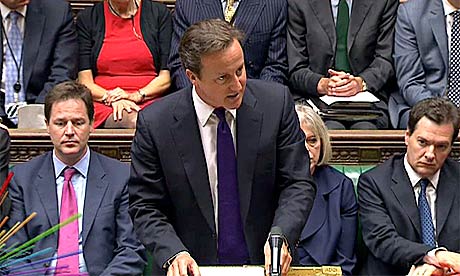UK Prime Minister calls for social media clampdown; could the US be next?
 Analystas are rushing in from all sides to examine the causes of the UK riots. Are they about politics and economics? Or is it merely an opportunity for thugs to steal stuff? All we know for sure is that it’s anarchy in the UK and that Saturday’s opening day match between Spurs and Everton has been postponed.
Analystas are rushing in from all sides to examine the causes of the UK riots. Are they about politics and economics? Or is it merely an opportunity for thugs to steal stuff? All we know for sure is that it’s anarchy in the UK and that Saturday’s opening day match between Spurs and Everton has been postponed.
One sobering development, though, should make British citizens sit up and take notice. For that matter, those of us in America and in every other democracy in the world (to the extent that the US can be called a democracy) need to be paying very close attention to the latest move by Brit Prime Minister David Cameron, who is calling on Parliament to consider enacting social media bans.
Amid continuing rioting in multiple cities across the U.K., British Prime Minister David Cameron said in Parliament that legislators should consider laws allowing officials to ban individuals from social media sites like Twitter and Facebook, if there is a chance those individuals intend to use the sites to plot violence. Cameron’s proposal, coming as thousands of British police attempt to reestablish order in blighted inner cities, acknowledges the central role played by social media in initiating, organizing, and spreading civil disorder — but immediately drew criticism as a misguided over-reaction, which does nothing to address the real causes of the violence.
Cameron told lawmakers that home secretary Theresa May will meet with executives from Facebook, Twitter, and Research In Motion, which makes Blackberry devices, to determine the feasibility of a social media ban on miscreants. This could include banning individuals who have already used social media to plan violence, and constant monitoring of social media to spot (and preempt) new episodes of violence in the planning phases.
Cameron explained to Parliament: “Everyone watching these horrific actions will be struck by how they were organized via social media. Free flow of information can be used for good. But it can also be used for ill. And when people are using social media for violence we need to stop them. So we are working with the police, the intelligence services and industry to look at whether it would be right to stop people communicating via these websites and services when we know they are plotting violence, disorder and criminality.”
There’s more at The Guardian.
Now, at a glance, there’s not a lot here to scare a dedicated law-and-order type. We’re just talking about cutting off miscreants, right? And no, I don’t think thugs and looters have any particular right to advanced technology in the pursuit of criminal activity.
The problem is that this only works if you trust the government when it comes to defining the terms. I mean, instead of the UK and Cameron (whom we trust because they’re a lot like us) let’s imagine if this had come from former Egyptian President Hosni Mubarak as the Arab Spring was collapsing around his ears. Imagine if it were Moammar Gaddhafi or Syrian President Bashar al-Assad (who’s currently in the process of stomping the shit out of his own protesters) insisting on a meeting with Facebook, Twitter and RIM. Imagine if there were enough North Koreans who haven’t been starved to death to work up a good riot – how would we feel if it were Kim Jong-Il instead of Cameron?
Most of us have a clear enough idea in our heads about the difference between a democratic protester and a criminal. Or, at least, we think we do. Usually, though, the difference can be quickly inferred from a basic look at who we support politically. History has taught us that the distinction between “freedom fighters” and “death squads” is often one of perspective.
So how, then, do we receive Cameron’s agitation for a social media smackdown? Is he an honest man looking to address the tools of common street crime? Or is he a hegemon looking for means of tamping down political protest that has boiled over in the wake of the failure of government policies?
Many Americans probably can’t fathom our leader, President Barack Obama, even contemplating such a move. Of course, once upon a time we wouldn’t have conceived of backscat security porn machines, granny shakedowns, diaper searches and gate-rape at our airports. Telecom carriers colluding with the NSA to spy on average citizens would have been unthinkable. The Patriot Act would have sparked a call to the barricades. Now we learn about the goddamned Super Patriot Act, which smells like a Soviet version of Dean Wormer’s double-secret probation activities against Delta House. And of course, we have to acknowledge that, pretty campaign rhetoric notwithstanding, Mr. Obama has expanded Bush-era affronts to our freedom, and we might also note that the roiling field of GOP probables looking to challenge a very vulnerable Obama in 2012 features precisely zero candidates known for their commitment to civil liberties.
At this point, perhaps the question isn’t whether the US government might contemplate shutting off social media in times of unrest. The better question might be whether they already have and this is where Cameron got the idea. Heck, is it possible that Cameron is, in part, floating a friendly trial balloon for his friends in DC? Maybe I’m being paranoid, but it’s been a long time since our government did anything on the civil liberties front to earn a presumption of innocence.
Given the direction our economy is heading and the zeal with which both parties are willing to collaborate against the middle and working classes in order to protect the financial interests of large corporations and our wealthiest citizens, it’s also not unreasonable to wonder whether the riots in the UK might be a foreshadowing of things to come over here. Which is to say, this is anything but idle navel-gazing.
And now, for the knee-buckling irony part of the discussion. What if we were to develop some street-level unrest in the US? And what if the government were to seek to shut down the social media channels being employed by organizers (or, for the sake of argument, let’s say they just moved to shut it down for everybody, you know, just until order was restored – and really, restoring order is all that Assad is looking to do, right)? Who would stand up for the cause of free speech?
Well, Google is a Fortune 100. Facebook is pretty big. RIM is smaller and dying, but still they have some heft. With a market valuation of $4 billion or better Twitter is nothing to sneeze at. And these companies represent a certain degree of influence where our political landscape is concerned. So they might be expected, in the name of shareholder value, to go to the mat in defense of their customers.
Or they might fold like a cheap lawn chair. Who knows. But they’d be the only potential dissenters whose voices had a hope of mattering.
Stay tuned. This one has the potential to get interesting. You know, interesting in the sense of “may you live in interesting times…”

Sam Smith
Samuel Smith lives a double life. Okay, triple life. By day he makes a living as a marketing consultant specializing in high-level strategy, branding, corporate communication and merging media and practices. In his "spare time" he's the executive editor of Scholars & Rogues, where he writes about everything from politics to music to sports to literature. Finally, he's an author of poetry and fiction whose work has appeared or is forthcoming in journals like storySouth, Poet & Critic, New Virginia Review, Cream City Review, High Plains Literary Review, The Dead Mule School of Southern Literature, Pemmican and Uncanny Valley. He holds a BA at Wake Forest and MA from Iowa State, and somehow endured the torturous process of earning a PhD in Communication from the University of Colorado.
Recent Comments
- Kucuka.net on Intellectual Property is a bad thing.
- evgeniy levchenko datums aangemeld on Debt slavery is a natural consequence of unregulated capitalism
- best career counselor on What will it take to address the climate emergency
- hyip on Debt slavery is a natural consequence of unregulated capitalism
- Tony Williams on Debt slavery is a natural consequence of unregulated capitalism
Blogroll
- 4dancers
- Aaron Krager
- Amygdala
- Autonomy for All
- Away Point
- Blue Jersey
- Bluemars
- Brad Blog
- Campaign for America's Future
- Cassandra Files
- Clear It with Sidney
- Cogitamus
- Crooks and Liars
- Cucking Stool
- Daily Show with Jon Stewart
- Dirty Hippie Sports Talk
- Disaffected and It Feels So Good
- Dispatches from the Culture Wars
- Dork with a Nerd Rising
- Eastern Sunz
- Florida Progressive Coalition
- Focal Points
- FOK News Channel
- Frederick Clarkson
- Frustrated Teacher
- Greatscat!
- HandPicked Nation
- Jazz from Hell
- jazz89 KUVO Public Radio
- Kenneth J. Bernstein
- La Bloga
- Lee Camp
- Litbrit
- Live Free or Die Alliance
- Live from the Left Coast
- MarioWire
- Media Matters
- Merge Left
- Mind Potion Radio
- MPA Political
- New York Communities for Change
- Nuclear Diner
- Political Carnival
- Progressive Leadership Action Network
- Progressive PST
- Radio or Not
- Republic Report
- Scholar as Citizen
- Scholars and Rogues
- Seeing the Forest
- Smirking Chimp
- Smoking Politics
- SomaFM
- Somos Tejanos
- Speak Out California
- Spedwybabs
- Spocko's Brain
- Stark Reports
- StarTalk
- Suburban Guerilla
- Symphony of Science
- Talk to Action
- thereisnospoon
- Today's Workplace
- Truth Vigilante
- Waking from the American Dream
- Worldwide Hippies
- WTF Is It Now?!?
- Error: Could not open handle for fopen() to http://heyhippies.tumblr.com/api/read?num=2
Category Cloud
Activism Americans Barack Obama Blogging Budget Bush II Administration Business Capitalism Class Warfare Congress Conservatives Corporatism Corruption Democracy Democrats Dirty Hippies Economy Education Elections Extremism Government Greed Health Care Jobs Journalism labor Media messaging Obama Administration Politics Progressives Religious Right Reproductive Rights Republicans Satire Social Security Taxation Tea Party Uncategorized Unions US Politics Violence Wall Street Wealth Wisconsin

